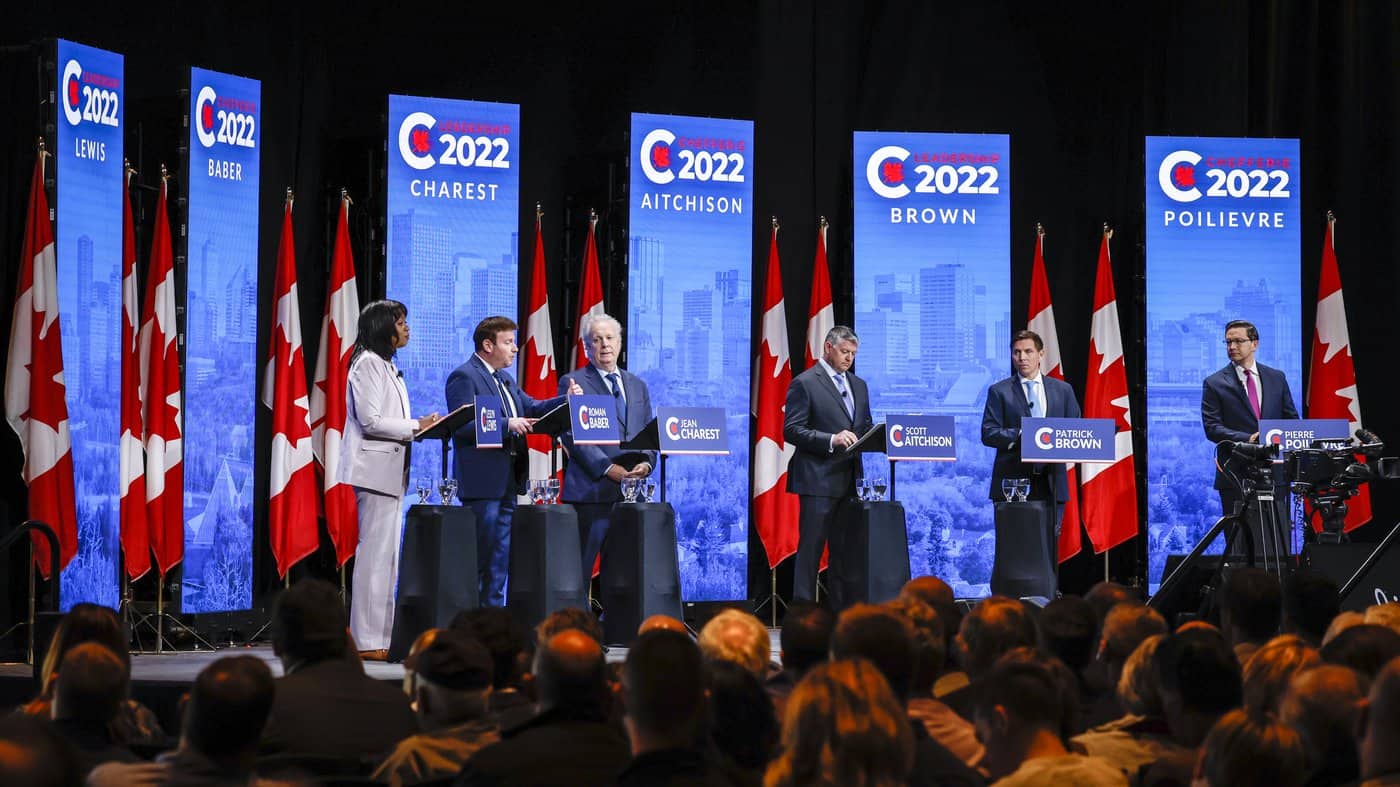Poilievre fends off attacks from Bramtpon Mayor Brown and Charest on Bitcoin, abortion
Published May 12, 2022 at 9:56 am

Brampton Mayor Patrick Brown took aim at Conservative leadership rival Pierre Poilievre’s embrace of the cryptocurrency Bitcoin at the first official leadership debate in Edmonton on Wednesday (May 11).
Candidates vying for the Conservative leadership framed the country — and the party — as deeply divided at the first official debate on Wednesday, and took turns pointing fingers at one rival they accuse of driving disunity in the race.
The loudest applause in the Edmonton Convention Centre, packed with more than 1,000 people, repeatedly went to longtime MP Pierre Poilievre.
A major part of his pitch is about fighting inflation, and Poilievre took aim at Bank of Canada governor Tiff Macklem, saying he would fire him because Canada’s inflation rate is the highest it’s been in decades.
“The Bank of Canada governor has allowed himself to become the ATM machine of this government. And so I would replace him with a new governor who would reinstate our low-inflation mandate, protect the purchasing power of our dollar and honour the working people who earn those dollars,” Poilievre said.
Jean Charest, Quebec’s former premier, responded by saying the MP’s remarks were irresponsible and sowed distrust in the system, while Leslyn Lewis said after the debate she found the comment concerning, saying it “undermines credibility in our economic system.”
Poilievre was the only candidate not to speak to reporters following the debate and was repeatedly targeted by other candidates on topics including his stance on abortion and Bitcoin.
RELATED: Brown and Poilievre trade blows in Conservative leadership rivalry
Charest, along with Lewis, accused Poilievre of encouraging Canadians to invest in the risky digital currency, while Brown said “magic internet money” like Bitcoin fluctuates wildly.
Brown said Poilievre shouldn’t be encouraging Canada’s vulnerable investors to gamble their savings.
In response, Poilievre said he did not encourage people to invest in Bitcoin, but does not want to see it banned because investors deserve the right to choose how to spend their money.
Without mentioning Poilievre by name, Brown used his opening statement to take a shot at the longtime Conservative’s bombastic political style, saying it’s not what the party needs to grow in suburbs and areas like the Greater Toronto Area.
“Do we want an unelectable party leader who drives voters away, walk straight into Liberal traps, giving unclear answers on divisible issues like abortion, and wedges Conservatives against each other?” Brown said.
Poilievre said that a government led by him wouldn’t pass or introduce legislation restricting access to abortion but Charest, who said he supports abortion rights, called that answer insufficient.
Poilievre later said he believes in freedom of choice and would allow free votes from his caucus on the topic. He also laid into Charest’s own record on the issue.
“You’re the only one on this stage who actually voted for a law that would recriminalize abortion when you were part of the Mulroney government. You did,” said Poilievre.
In 1990, Charest voted in favour of Bill C-43, which Brian Mulroney’s government brought in after a 1988 Supreme Court ruling decriminalized abortion. The bill would have recriminalized the procedure except when a woman’s health was at risk, but it died in a tie vote in the Senate.
Most of the six candidates directly referenced COVID-19 vaccine mandates as one of the key reasons for what they see as division in the country, with Lewis saying she believes Canada needs to become a beacon of life again because people are “traumatized” from pandemic-related health rules.
Charest was a notable exception, as he pointed to disagreements over oil and gas between the eastern and western parts of the country as the cause of the conflict.
“I see a country that is deeply divided and I am running because I believe that national unity is the No. 1 challenge of any prime minister,” he said.
Although the race has been described as a contentious battle for the soul of the party after three consecutive election losses to the Liberals, the atmosphere of Wednesday’s event was at times markedly lighter. Candidates were asked a series of personal questions about their favourite political heroes, what books they were reading and the last television show they binged.
This report by The Canadian Press was first published May 11, 2022.
INsauga's Editorial Standards and Policies


